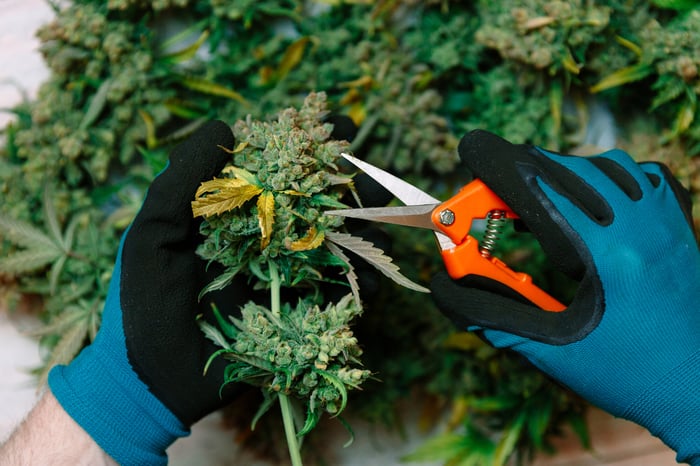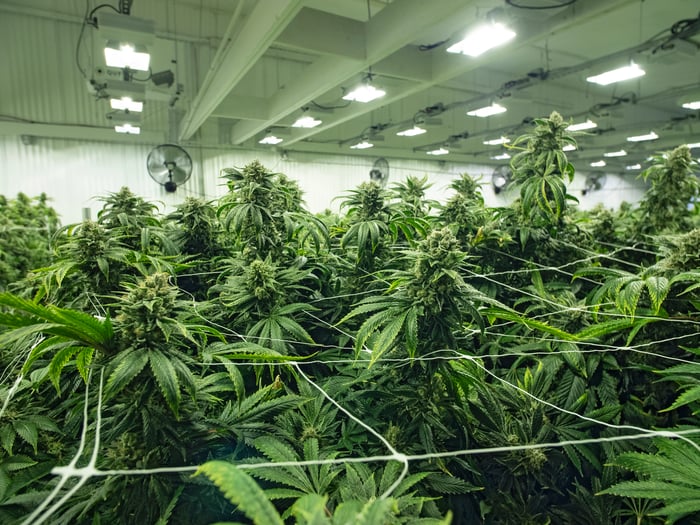Chances are that you'd struggle to find a more attractive growth opportunity over the next 10 years than legal cannabis. Sales in the global pot industry more than tripled over the previous four years, and they're on track to grow between fivefold and 18-fold between 2018 and 2030, according to Wall Street's wide range of forecasts.
However, "next big thing" investments do have a near-guaranteed drawback: Each and every hot investment will see its bubble burst. The expectations of Wall Street and investors are always too lofty when new trends hit the market, and cannabis has proven no different. Since marijuana has only recently been legalized at the recreational level in an industrialized country, it's as much a learning curve for the businesses operating in this space as it is for investors and regulators.

Image source: Getty Images.
Marijuana stocks are contending with a number of growing pains
In Canada, for example, supply issues have been ravaging the cannabis space since adult-use sales began one year ago, on Oct. 17, 2018. Health Canada, the regulatory agency tasked with overseeing the legal weed industry and approving or denying a variety of licenses, has been bogged down by a monstrous backlog of license applications. Even with a change to the cultivation-license application process, there's no easy way for the agency to quickly work through a backlog of more than 800 applications.
Similarly, select Canadian provinces have been doing marijuana stocks no favors by slow-stepping the rollout of physical dispensaries. Consumers would much prefer to buy their product in physical stores rather than online, but some provinces have only a handful of open stores. Right now, Ontario has about one dispensary open for every 604,200 of its residents. This slow rollout, along with Health Canada's backlog, has encouraged consumers to stick with black-market producers.
The United States hasn't escaped unscathed, either. Whereas supply hasn't been a big problem in the U.S., high tax rates have been. California, whose residents voted to legalize recreational pot via Proposition 64 in November 2016, actually saw year-over-year sales decline $500 million in 2018, the first year of adult-use revenue, from 2017, when only medical marijuana was available for sale. This decline is the result of California's exorbitant aggregate tax on legal cannabis, which can total as much as 45% per locale. Again, this is akin to rolling out the red carpet for black-market growers that don't have to worry about these taxes or licenses.
With the persistence of problems in North America, both profitability and the opportunity to collect dividend income from marijuana stocks look to be a long way off.
Or are they?

Image source: Getty Images.
Your eyes aren't deceiving you -- a high-yield pot stock does exist
For one pure-play cannabis stock, not only has profitability been the norm for quite some time, but it's currently offering its shareholders a dividend yield of 4.3%, or about double that of the S&P 500. Say hello to the only high-yield, pure-play marijuana dividend stock on the planet: Innovative Industrial Properties (IIPR -0.82%).
The secret sauce that's allowed IIP to buck the money-losing ways of other pot stocks is the fact that it's a real estate investment trust (REIT). Like any REIT, its focus is to acquire land and buildings, then lease these assets out for an extended period. In doing so, it reaps the reward of rental income; it can, if it chooses, sell its assets many years down the line for a profit. In IIP's case, it acquires medical marijuana growing and processing sites, then leases them out.
The beauty of the REIT model is that it's generally low-cost, and there are clear tax benefits. As a REIT, Innovative Industrial Properties avoids normal corporate income tax rates. In return, it divvies out a significant portion of its earnings in the form of a dividend to its shareholders. This is a big reason why IIP's dividend of $0.78 per quarter is so lofty.
As of Innovative Industrial's two property acquisitions earlier this week, it owned 34 properties in 12 states that spanned approximately 2.5 million square feet of rentable space. Now, here's the really great part about this business: IIP's weighted-average remaining lease length is 15.8 years, and its current yield on invested capital is 13.9%. This means it'll be generating consistent cash flow for well over a decade from now, and it should have a complete payback of its $354.6 million of invested capital in a little over five years. Virtually nothing about the marijuana industry offers a shred of predictability...except Innovative Industrial Properties' asset portfolio.

Image source: Getty Images.
It's also worth mentioning that IIP passes along rental increases to its tenants of 3.25% per year; it also collects a 1.5% property management fee that's based on the rental rate. In other words, it's provided itself with modest organic growth that should help it stay ahead of the inflationary curve.
Add all of this up, and it's easy to see how IIP's quarterly payout has risen an apropos 420% over the past two years ("420" being a term used in cannabis culture to describe the consumption of marijuana).
This high-yield cannabis stock has two risks to be aware of
Compared to the majority of marijuana stocks, IIP's business model is pretty safe and predictable. But not even the safest stocks are without risks -- and IIP comes with two that are worth noting.
Firstly, the REIT model is highly capital-intensive; it takes quite a bit of money to build a diversified portfolio of assets. In IIP's case, it's been selling shares of its common stock to raise money for additional acquisitions. While selling stock is really common for REITs, regardless of the industry, it has the effect of diluting existing shareholders. Thankfully, the impact of share-based dilution has only been felt for a short period, at least based on the reaction to IIP's previous share issuances.

Image source: Getty Images.
The other potential concern would be the possible passage of the Secure and Fair Enforcement (SAFE) Banking Act, which would allow banks and credit unions to offer their services to cannabis businesses in legal states without federal prosecution. Right now, IIP is thriving because marijuana companies don't want to shell out big bucks to acquire growing and processing facilities. Instead, they'd rather rent from IIP and not have to worry about maintenance costs or parting ways with a lot of their capital.
However, if these U.S. growers or processors suddenly gained access to basic banking services and had lines of credit or loans at their disposal, IIP's services might become less desirable. IIP's command of the rental space looks safe for now, given the Republican majority in the Senate. But should Mitch McConnell, R-Ky., no longer head the Senate Republicans, banking reform would then become a real possibility.
I stand by my conviction that Innovative Industrial Properties is a safe, high-yield cannabis stock. But as with any potential investment, it's important to understand both sides of the coin.





